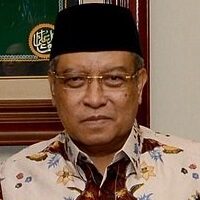Leadership
Dr. Said Aqil Siradj

Siradj, like his predecessors, propagates the Nahdlatul Ulama as an organization that is geared toward establishing a secular nation-state based on a body of modern and moderate Muslims—with agenda items such as anti-corruption laws and social reform measures that are deeply rooted in Islamic principles.
The most recent publication of the 500 Most Influential Muslims by the Royal Islamic Strategic Studies Centre in Jordan ranked him as the 20th most influential Muslim person in the world.
In addition to his leadership within Nahdlatul Ulama, Prof. Dr. Siradj also founded the Said Aqil Centre, an organization in Egypt which focuses on developing Islamic discourse in the Middle East.
Prior to his role as Nahdlatul Ulama chairman, Prof. Dr. Siradj served on Indonesia’s National Commission for Human Rights. Only a few weeks into his position as chairman of the country’s largest Muslim political party, and after violent clashes erupted in different churches across the country, Siradj made strong statements condemning the discrimination against Christian minority groups in Indonesia.
Prof. Dr. Siradj has an extensive academic background in the Islamic sciences, and regards education as a tool for development. He founded the Said Aqil Centre in Egypt, a study center that focuses on developing Islamic discourse, particularly in the Arab World.